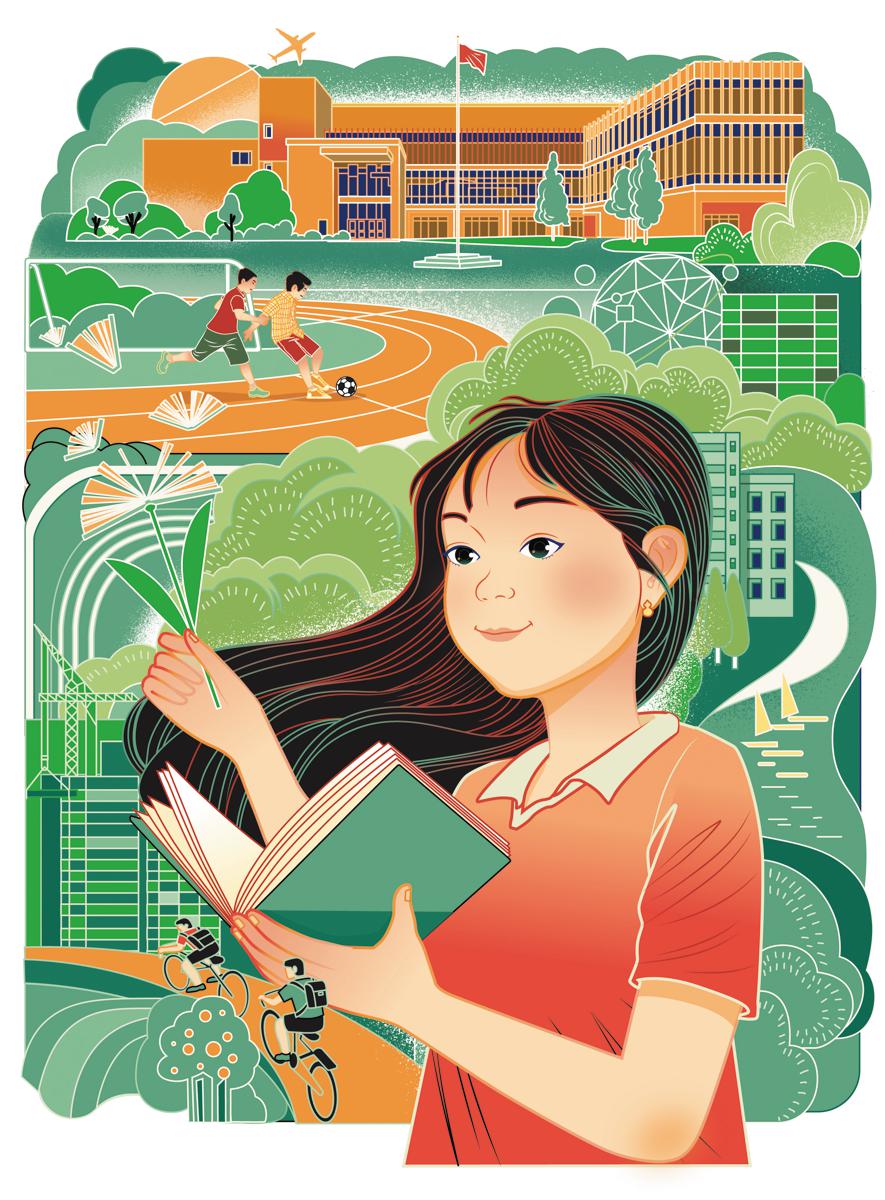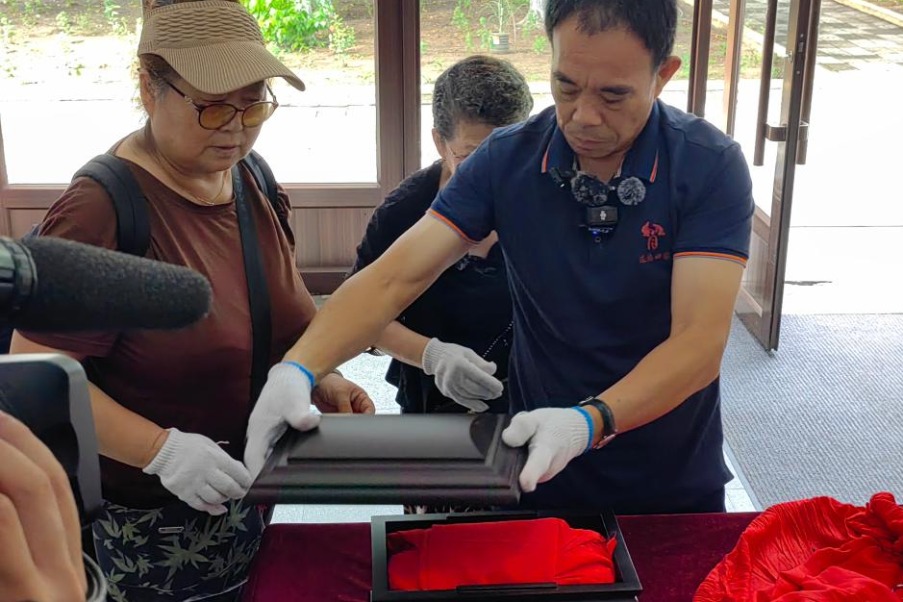Path laid out for education reform
Nation aims to become leader in learning in coming decade


China has set out a concrete roadmap to build up its strength in education to support its modernization drive, with authorities issuing a sweeping plan guiding the country's educational reform for the coming decade.
The plan, jointly issued by the Communist Party of China Central Committee and the State Council and made public on Jan 19, puts forward a two-phased objective, calling for the establishment of a high-quality educational system by 2027.
Covering basic, higher and vocational education, the plan reiterates China's goal to turn itself into a leading country in education by 2035.
By that year, the country's basic education system, which mostly spans from preschools to senior high schools, should rank among the best in the world in terms of its universality and quality, the plan said.
The country should also form a society based around learning and significantly enhance the role of education in serving national strategies by then, according to the plan.
Schools are required to aim for the healthy and comprehensive development of students and speed up efforts to shore up weaknesses in physical, aesthetic and labor education.
It called on elementary and high schools to ensure students receive no less than two hours of physical activities per day, build up soccer courses and control obesity and myopia, adding that they should implement a program to boost children's hands-on abilities and their capacity to solve complicated problems.
Local authorities are also required to consolidate the results of a national campaign launched in 2021 to ease the burden of homework and off-campus training on children.
They must strictly control off-campus academic tutoring, and let schools play a major part in improving children's academic performances. Schools are urged to reduce the amount of repetitive homework and strengthen science education and the cultivation of core competencies.
Yang Yinfu, vice-president and secretary-general of the Chinese Society of Education, said that a major advantage of China's basic education lies in its ability to help students firmly grasp the knowledge they have learned.
But repetitive and heavy homework risks reducing the time children spend on physical activities and eroding their enthusiasm for learning, Yang said, adding that it's an utmost task for basic education to foster adaptability, creativity and other core competencies bearing on lifelong development.
The plan also called for establishing a system to monitor the changes in the school-age population for all grade levels and readjusting the number, scale and locations of schools and kindergartens accordingly.
Researchers have noticed how changes in the country's birthrate may challenge education. The annual population of newborns in China has dropped rapidly after the most recent peak at 18.83 million in 2016.
This led to the peaking of the number of children enrolled in elementary schools in 2023 and a drop afterward in some regions, said Liu Shanhuai, a distinguished professor at South China Normal University.
The drastic increase and decrease in student numbers risks straining and then idling educational resources at different grade levels in the coming years, Liu said.
On the other hand, schools in some big cities are under pressure from a continuous inflow of people, while those in some rural areas are receiving fewer and fewer students, according to Liu.
As a result, the measures laid out in the plan such as allocating educational resources promptly across different grade levels, promoting smaller class sizes and expanding educational resources for cities witnessing an increase in residents, are highly pertinent in addressing the demographic changes, Liu said.
The plan asks local authorities to diversify their senior high schools to develop different kinds of talent.
It also clarifies that the country will carry out programs to promote science literacy among elementary and junior high school students, while fostering the development of senior high school students who have shown promising potential in innovation.
Such arrangements take into account both education equality and the individual needs of outstanding students, said Yang from the Chinese Society of Education.
Ma Xiaoqiang, a researcher with the China National Academy of Educational Sciences, said that tech and industrial revolutions unfolding rapidly around the world require children's early exposure to science education.
"Everyone can be innovative," Ma said. "We need to develop children's respect and passion for science and the pursuit of truth, which will benefit them greatly in their future lives."
The programs will allow China to better tap into its rich human and educational resources and find the "very few" and "very gifted" to promote its high-quality growth, he said.
In addition to basic education, the plan puts forth detailed requirements for reforming higher education.
The country supports different higher education institutions in forging their own special advantages such as in science, engineering, agriculture, medicine, liberal arts and physical education, it said.
The country must develop world-class universities and disciplines featuring Chinese characteristics at a faster pace, and establish disciplines that are urgently needed by national strategies, the plan added, and encouraged high-quality science and engineering universities in other countries to work with Chinese universities and run academic programs in China.
In the past year, China has strengthened its efforts to readjust disciplines in universities and colleges.
According to Wu Yan, vice-minister of the Ministry of Education, in 2024, the country set up more than 1,600 undergraduate programs to support national strategies and slashed nearly as many programs that failed to meet socioeconomic needs.
Ma, the researcher, said the differentiated development of universities and colleges will help them find their niche for survival. He suggested companies and other recruiters take part in the designing of academic programs to share their perspectives on what kinds of disciplines, talent and skills are needed.
Another emphasis of the plan is lifelong learning, the necessity of which has been highlighted by emerging technologies such as artificial intelligence.
The plan calls for improved public support, including open universities, senior citizen universities and a "national digital university" for building a learning society.
The country will implement a strategy to digitalize education, according to the plan.
It will continue to construct and utilize Smart Education of China, a public platform sharing online courses, build the national big data center for education, and explore ways to innovate teaching at school using digital technologies.
Advocating the utilization of AI to build up teachers' competence, the plan said the country will develop a large model for education and "schools on cloud", and establish an evaluation and decision-making system based on big data and AI.
Noting that China has been providing highly affordable lifelong learning support in various forms such as online platforms, community colleges and libraries, Ma said lifelong learning is essential to guarantee both the public's well-being and the country's competitive edge in the fast-changing world.
Xiong Bingqi, director of the 21st Century Education Research Institute, said measures outlined in the plan meet the emerging demand from the public for better and more equitable education, after the country has popularized different kinds of education.
As the country's population is declining, greater efforts are required to nurture high-quality talent and improve labor productivity, Xiong said.
Zhao Yimeng contributed to this story.
wangqingyun@chinadaily.com.cn
- American musician: the Silk Road influenced American music
- China upgrades Ragasa to super typhoon
- Over 5,000 photographers showcase work in Shanxi's ancient city of Pingyao
- Li calls on US lawmakers to enhance exchanges, ties
- Luxury brands drop ads featuring S. Korean actress after she insults China
- Jiangmen activates Chikungunya fever L3 emergency response




































